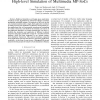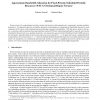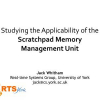123
Voted
SAMOS
2010
Springer
15 years 27 days ago
2010
Springer
—Memory bandwidth has always been a critical factor for the performance of many data intensive applications. The increasing processor performance, and the advert of single chip m...
126
click to vote
SAMOS
2010
Springer
15 years 27 days ago
2010
Springer
—High-level simulation and design space exploration nowadays are key ingredients for system-level design of modern multimedia embedded systems. The majority of the work in this a...
122
Voted
SAMOS
2010
Springer
15 years 27 days ago
2010
Springer
—Previous vector architectures divided the available register file space in a fixed number of registers of equal sizes and shapes. We propose a register file organization whic...
118
click to vote
RTAS
2010
IEEE
15 years 27 days ago
2010
IEEE
—The problem of scheduling a set of tasks on a multiprocessor architecture is addressed. Tasks are assumed to be sporadic with arbitrary deadlines and may migrate between process...
127
click to vote
RTAS
2010
IEEE
15 years 27 days ago
2010
IEEE
Abstract—Some real-time kernels (such as a recent realtime version of Linux) permit to execute interrupt handlers in dedicated threads, to control their interference on realtime ...
115
Voted
RTAS
2010
IEEE
15 years 27 days ago
2010
IEEE
The specification of the sporadic server real-time scheduling policy in the IEEE POSIX standard is defective, and needs to be corrected. Via experiments using a POSIX sporadic se...
142
click to vote
RTAS
2010
IEEE
15 years 27 days ago
2010
IEEE
—Hardware-managed caches introduce large amounts of timing variability, complicating real-time system design. One alternative is a memory system with scratchpad memories which im...
127
Voted
RTAS
2010
IEEE
15 years 27 days ago
2010
IEEE
Recent research in compositional real-time systems has focused on determination of a component’s real-time interface parameters. An important objective in interface-parameter de...
114
click to vote
RTAS
2010
IEEE
15 years 27 days ago
2010
IEEE
—This article studies the scheduling of critical embedded systems, which consist of a set of communicating periodic tasks with constrained deadlines. Currently, tasks are usually...
80
Voted
RTAS
2010
IEEE
15 years 27 days ago
2010
IEEE





